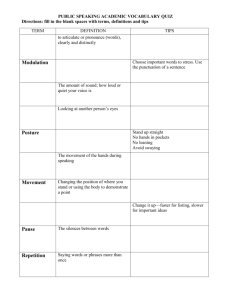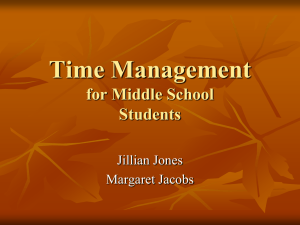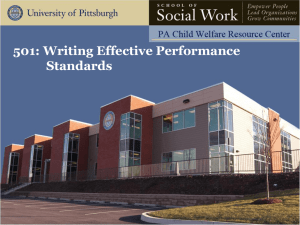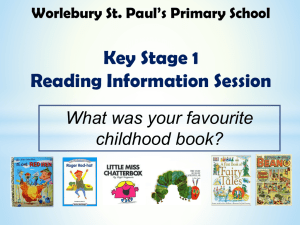Planning With Youth in Transition Tips, Tools and Techniques
advertisement
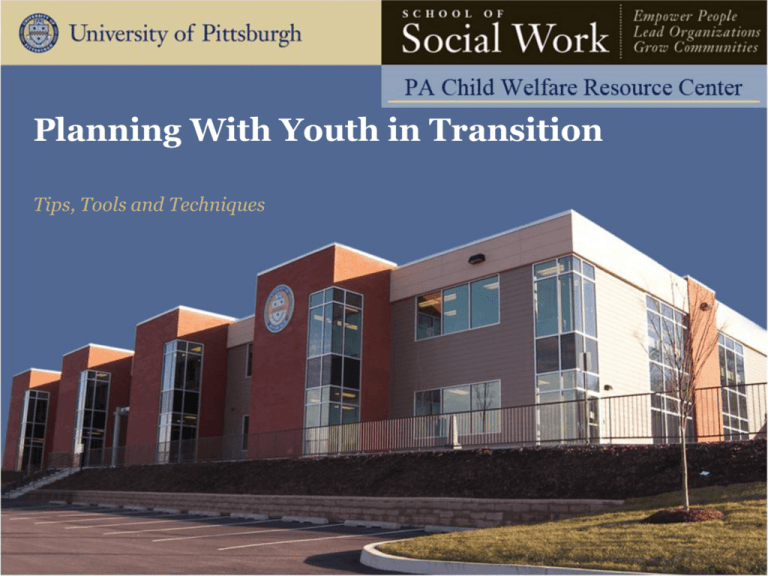
Planning With Youth in Transition Tips, Tools and Techniques Agenda • • • • • • • • • Introductions, Objectives, What’s In It For Me? Juvenile Court Rules – Rule 1608 Pre-Transition Planning Tools Tips for Engaging Youth in Transition Planning Juvenile Court Rules – Rule 1613 Trial Discharge Improving Outcomes Using Court Rules – Activity Review, Questions, and Answers Monitoring the Transition Plan The Pennsylvania Child Welfare Resource Center 202: Planning with Youth in Transition: Tips, Tools, and Techniques 2 Learning Objectives 1. Examine new PA court rules on transition planning; 2. Examine transition assessment and planning tools; 3. Demonstrate the use of rules to advocate for older youth; and 4. Explain the process of engaging older youth in planning The Pennsylvania Child Welfare Resource Center 202: Planning with Youth in Transition: Tips, Tools, and Techniques 3 Transition Planning: Why is it Important? • % of older youth in system is growing • Poor outcomes for youth who age out without permanency: – Incarceration – Reliance on public assistance – Homelessness • Required by federal law (Fostering Connections) The Pennsylvania Child Welfare Resource Center 202: Planning with Youth in Transition: Tips, Tools, and Techniques 4 New Pennsylvania Court Rules • New rules released in July 2011 to help youth transition successfully to adulthood – Rule 1608 (Independent Living Planning) – Rule 1613 (Transition Planning) The Pennsylvania Child Welfare Resource Center 202: Planning with Youth in Transition: Tips, Tools, and Techniques 5 Independent Living Planning Court Rules • Requires court make certain findings for all youth age 16+ at every 6 month court hearing – Opportunity to advocate for needed assessments, services – Lays foundation for successful transition to adulthood The Pennsylvania Child Welfare Resource Center 202: Planning with Youth in Transition: Tips, Tools, and Techniques 6 Independent Living Rule (1608) Old rule: “…services needed to assist a child who is sixteen years of age or older to make the transition to independent living.” The Pennsylvania Child Welfare Resource Center 202: Planning with Youth in Transition: Tips, Tools, and Techniques 7 New Independent Living Court Rule New rule 1608 • Areas of need, services provided, needed • Least restrictive environment • Connections with supportive adults • Educational progress • Employment goals and readiness • Health, behavioral health needs • Plans for stable housing The Pennsylvania Child Welfare Resource Center 202: Planning with Youth in Transition: Tips, Tools, and Techniques 8 Independent Living, Pre-Transition Tools • Use of Assessment and Planning Tools – CWRC transition assessment, screen, plan – Fostering Connections Transitions Toolkit – Pike County Transition Binders • Child Preparation Services • Transition planning focused meetings – Family Group Decision Making – Team Meetings The Pennsylvania Child Welfare Resource Center 202: Planning with Youth in Transition: Tips, Tools, and Techniques 9 Tips for Engaging Youth The Pennsylvania Child Welfare Resource Center 202: Planning with Youth in Transition: Tips, Tools, and Techniques 10 Transition Court Rules: Termination of Court Supervision Old rule allowed case to close when child was 18 years old and no longer wanted services The Pennsylvania Child Welfare Resource Center 202: Planning with Youth in Transition: Tips, Tools, and Techniques 11 New Court Rule (Rule 1613): Termination of Court Supervision If court seeks to discharge 18+ year old: • Hearing at least 90 days before discharge • Youth must attend • Transition plan developed before hearing with child • Appropriate plan approved by court The Pennsylvania Child Welfare Resource Center 202: Planning with Youth in Transition: Tips, Tools, and Techniques 12 Requirements of Transition Plan: • • • • • • • • • Housing Source of income Educational or vocational training goals Employment Health insurance plan Health or behavioral health needs Mentors/positive adult connections Vital identification documents and records provided Other needed support services The Pennsylvania Child Welfare Resource Center 202: Planning with Youth in Transition: Tips, Tools, and Techniques 13 Termination of Supervision • Court cannot terminate supervision without approving appropriate transition plan… …UNLESS child, after appropriate plan is offered, is unwilling to consent to supervision and court determines termination is warranted The Pennsylvania Child Welfare Resource Center 202: Planning with Youth in Transition: Tips, Tools, and Techniques 14 The Fostering Connections to Success and Increasing Adoptions Act of 2008 • Federal law enacted to: Connect and support relative caregivers Improve outcomes for children in foster care • Pennsylvania enacted Act 91 and Act 80 to: Implement Fostering Connections Provide greater opportunities and support to older youth in foster care The Pennsylvania Child Welfare Resource Center 202: Planning with Youth in Transition: Tips, Tools, and Techniques 15 Act 91 of 2012 Effective July 5, 2012 Expanded criteria for youth to stay in out-of-home care beyond age 18 until age 21 by amending the definition of “Child” in the Juvenile Act to include an individual who: • Is under the age of 21 years and was adjudicated dependent before reaching the age of 18 years, who has requested the court to retain jurisdiction and who remains under the jurisdiction of the court as a dependent child because the court has determined that the child is: • (i) completing secondary education or an equivalent credential; • (ii) enrolled in an institution which provides postsecondary or vocational education; • (iii) participating in a program actively designed to promote or remove barriers to employment; • (iv) employed for at least 80 hours per month; or • (v) incapable of doing any of the activities described in subparagraph (i), (ii), (iii) or (iv) due to a medical or behavioral health condition, which is supported by regularly updated information in the permanency plan of the child. The Pennsylvania Child Welfare Resource Center 202: Planning with Youth in Transition: Tips, Tools, and Techniques 16 Act 91 of 2012 Effective July 5, 2012 Allowed for resumption of jurisdiction for youth to return to out-of-home care beyond age 18 until age 21 by amending the definition of “Child” in the Juvenile Act The Pennsylvania Child Welfare Resource Center 202: Planning with Youth in Transition: Tips, Tools, and Techniques 17 Act 91 of 2012 Criteria • The Individual: – Is under the age of 21 years and – was adjudicated dependent before reaching the age of 18 years, – has requested the court to retain jurisdiction, and – has remained under the jurisdiction of the court as a dependent child. • Termination of dependency court jurisdiction must have occurred within 90 days of the youth turning 18, or after age 18. The Pennsylvania Child Welfare Resource Center 202: Planning with Youth in Transition: Tips, Tools, and Techniques 18 Act 91 of 2012 Criteria (continued) • Court has determined that the child is: – (i) completing secondary education or an equivalent credential; – (ii) enrolled in an institution which provides postsecondary or vocational education; – (iii) participating in a program actively designed to promote or remove barriers to employment; – (iv) employed for at least 80 hours per month; or – (v) incapable of doing any of the activities described in subparagraph (i), (ii), (iii) or (iv) due to a medical or behavioral health condition, which is supported by regularly updated information in the permanency plan of the child. The Pennsylvania Child Welfare Resource Center 202: Planning with Youth in Transition: Tips, Tools, and Techniques 19 Act 80 of 2012 Effective July 1, 2012 • Extended adoption subsidies for eligible youth Under the age of 21 years Attained 13 years of age before adoption assistance agreement was finalized Met certain conditions • Extended guardianship subsidies for eligible youth • Amended and added several definitions The Pennsylvania Child Welfare Resource Center 202: Planning with Youth in Transition: Tips, Tools, and Techniques 20 Act 80 of 2012 Definitions • Definition of “child” in Public Welfare Code includes an individual who: – is under the age of twenty-one years and who attained thirteen years of age before the adoption assistance agreement became effective and who is: – (i) completing secondary education or an equivalent credential; – (ii) enrolled in an institution which provides postsecondary or vocational education; – (iii) participating in a program actively designed to promote or remove barriers to employment; – (iv) employed for at least eighty hours per month; or The Pennsylvania Child Welfare Resource Center 202: Planning with Youth in Transition: Tips, Tools, and Techniques 21 Act 80 of 2012 Definitions (continued) – (v) incapable of doing any of the activities described in subclause (i), (ii), (iii) or (iv) due to a medical or behavioral health condition, which is supported by regularly updated information in the permanency plan of the child. • • • • • • • Eligible Child Eligible permanent legal custodian Kin Permanent Legal custodian Subsidized permanent legal custodianship Subsidized permanent legal custodianship agreement Relative Notification The Pennsylvania Child Welfare Resource Center 202: Planning with Youth in Transition: Tips, Tools, and Techniques 22 Improving Outcomes Using Court Rules • Court oversight of youth’s plan, agency’s support • Opportunity to engage youth • Continued court jurisdiction if transition plan is absent or weak • Implements Fostering Connections legislation The Pennsylvania Child Welfare Resource Center 202: Planning with Youth in Transition: Tips, Tools, and Techniques 23 Activity • What does Sienna need? • What is her transition plan, as presented, missing? • What would you advocate for Sienna? • How should court order be written to ensure she receives what she needs? The Pennsylvania Child Welfare Resource Center 202: Planning with Youth in Transition: Tips, Tools, and Techniques 24 Tools/Suggestions for Preparing Youth for Court • Institute hearing requiring youth participation – Cumberland County – Northumberland County – Adams County • Prepare tools that help youth participate – Youth Fostering Change Youth-Developed Discharge Hearing Form The Pennsylvania Child Welfare Resource Center 202: Planning with Youth in Transition: Tips, Tools, and Techniques 25 The Transition Plan in the Real World The Pennsylvania Child Welfare Resource Center 202: Planning with Youth in Transition: Tips, Tools, and Techniques 26 Monitoring the Transition Plan • What are some good techniques to assist in monitoring a transition plan? • How do alumni want to be supported and how can we help? • What are some strategies to try if the transition plan isn’t working as planned? The Pennsylvania Child Welfare Resource Center 202: Planning with Youth in Transition: Tips, Tools, and Techniques 27 Tips for Successful Transition Plans • Begin early • Engage youth, supportive adults • Maintain high expectations but be realistic about steps to achieve goals • Be concrete, specific • Create back-up plans The Pennsylvania Child Welfare Resource Center 202: Planning with Youth in Transition: Tips, Tools, and Techniques 28

